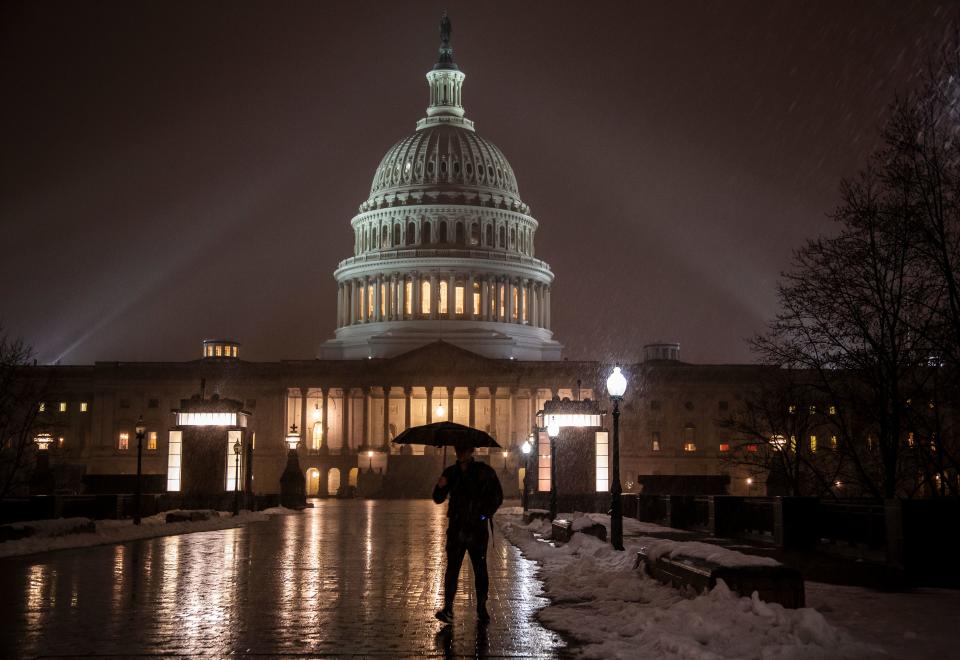When will federal workers get paid? Reopening the government not as easy as flipping a light switch
WASHINGTON – Getting the government back to full speed following a 35-day shutdown is a bit like trying to turn around an aircraft carrier: It doesn't happen very quickly.
Now that President Donald Trump and congressional leaders have reached a deal to reopen the government for three weeks, the administration has begun the task of calling back the 800,000 workers who were no longer getting paid from the partial shutdown that began Dec. 22 over a budget impasse tied to the president's demand for billions in border wall funds.
Many of those workers have been deemed "essential" and been called back from furlough over the past few weeks. But some of those have opted not to show up, resulting in delays at airport security checkpoints and potentially longer waits for tax returns.

The shutdown already has exacted a financial cost: $6 billion as of Jan. 25, according to estimates by S&P Global Ratings. That's $1.4 billion more than Trump's demand for $5.7 billion for a wall on the Southern border.
With the shutdown over – at least for now – there are plenty of logistics to carry out: employees to bring back, national parks to reopen, and tax refunds to process.
Here are how the reopening could affect several groups:
Federal workers
They'll get their back pay but not it's not clear how fast. The White House Friday tweeted that it would be "in the coming days."
Because of the President’s actions, Federal workers will be paid in the coming days.
To the public servants who have worked without pay and been furloughed, we thank you. To Congress, it is time to negotiate and address the humanitarian crisis on our border once and for all.— The White House (@WhiteHouse) January 25, 2019
Friday was the second payday for most workers since the shutdown began.
With bills to pay and creditors – potentially – breathing down their necks, workers are anxious to see money in their bank accounts.
The good news is they will be treated as if they had never been forced to miss work, according to the U.S. Office of Personnel Management. They'll accrue sick time and vacations days as if they had been working all along, and their pension calculation will assume they were on the job without interruption.
If they applied for unemployment and started receiving benefits, they'll have to repay what they received in full.
Airport travelers
With the government reopen, security checkpoint wait times, especially in high-volume airports such as those in Atlanta and the Baltimore-Washington region, should ease quickly.
Financial hardship has prompted "sickouts" by TSA workers who process airport checkpoints. And "staffing" issues among air traffic controllers who manage the nation's airspace were blamed for flight delays at several airports in the Northeast.
Related: FBI Director Christopher Wray: Government shutdown 'mind-boggling' and 'short-sighted'
Roughly 800,000 federal workers were affected by the shutdown. Of those, about 50,000 are airport security workers, who have been working despite not getting paid because they are considered "essential." TSA recently acknowledged that some airports have experienced long security lines because of staffing shortages.
"While national average wait times are within normal TSA times of 30 minutes for standard lanes and 10 minutes for TSA Precheck, some airports experienced longer than usual wait times," the TSA said in a statement.
National park visitors
Some parks never officially closed (though they shuttered their visitor centers) but about a third did, mostly historic sites such as Fort McHenry in Baltimore.
Some won't be open right away due to cleanup of trash, graffiti and human waste that were left on their grounds. Others may have limited access for a while due to natural causes such as snow-covered roads that have to be plowed.
Kristen Brengel, a lobbyist for the National Parks Conservation Association, an advocacy organization, said she believes the administration will do its best to reopen parks and sites quickly.
"The Park Service is an agency that wants to be open to the public," she said. "So if there are roads that have been covered in snow for a month now, the Park Service may need a bulldozer instead of a plow to open. It kinds of depends on the situation as to whether or not a park can be open instantly."
Small business owners
The reopening means the federal government can continue helping small businesses: the Small Business Administration can once again process loan requests, mom-and-pop stores near national parks can resume selling goods and services to visitors, and small businesses with federal contracts for a broad range of services can start getting paid again.
Even if the restart is quick, it might be too late for some, said John Arensmeyer, CEO and founder of Small Business Majority.
“It’s an inescapable fact that the partial government shutdown inflicted substantial damage on America’s small firms," he said. "Since most small firms have little if any financial safety net, a small dip in earnings can be an existential blow and many small firms will not recover anytime soon from the losses they incurred over the past month.
This article originally appeared on USA TODAY: When will federal workers get paid? Reopening the government not as easy as flipping a light switch

